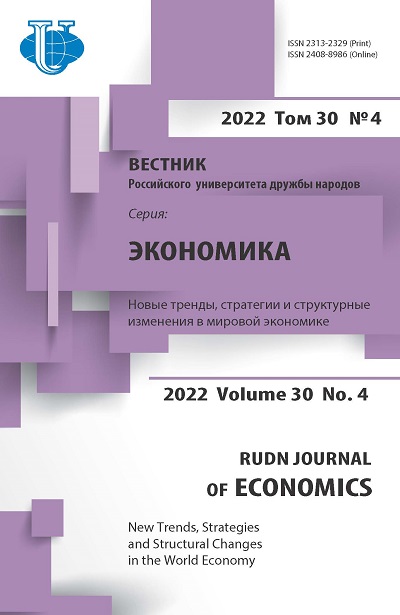Priority areas for the creation of scientific consortiums in the EAEU
- Autores: Belov F.D.1
-
Afiliações:
- The Russian Research Institute of Economics, Politics and Law in Science and Technology (RIEPL)
- Edição: Volume 30, Nº 4 (2022): NEW TRENDS, STRATEGIES AND STRUCTURAL CHANGES IN THE WORLD ECONOMY
- Páginas: 467-483
- Seção: Economic integration and globalization
- URL: https://journal-vniispk.ru/2313-2329/article/view/324163
- DOI: https://doi.org/10.22363/2313-2329-2022-30-4-467-483
- ID: 324163
Citar
Texto integral
Resumo
The author proposed to open a scientifi consortium on the basis of scientifi and educational organizations located in the member countries of the EAEU. The relevance and importance of creating such a consortium, which are associated with the intensifi of the development of partnerships between the EAEU countries, support for scientifi and technological cooperation between the EAEU countries at the highest state level, as well as the signifi scientifi potential of the EAEU countries and the existing infrastructure, are shown. The author presents priority areas in which scientifi consortiums can be created. Priority areas were determined based on the results of a bibliometric analysis of statistical data on the publication activity of the EAEU countries for 5 years. The analytical service Web of Science Incites was used as an analysis tool. Based on the results of the study, scientifi fronts were identifi - areas with the highest publication activity and citation for each of the EAEU countries. By comparing the directions, the most priority directions for the creation of scientifi consortiums were determined.
Sobre autores
Filipp Belov
The Russian Research Institute of Economics, Politics and Law in Science and Technology (RIEPL)
Autor responsável pela correspondência
Email: belov@riep.ru
ORCID ID: 0000-0003-1725-6873
Ph.D., Head of the Center for Research of Organizational Processes in Science and Innovation
20A Dobrolubova St, Moscow, 127254, Russian FederationBibliografia
- Andronova, I.V., Belova, I.N., Ganeeva, M.V., & Moseikin, Yu.N. (2018). Scientific-Technical Cooperation within the Eaeu as a Key Factor of the Loyalty of the Participating Countries’ Population to the Integration and of Its Attractiveness for New Members. Rudn Journal of Sociology, 1(18), 117–130. https://doi.org/10.22363/2313-2272-2018-18-1-117-130
- Anichkin, E.S., & Serebryakov, A.A. (2019). Legal regulation of technology parks in individual countries of the Shanghai Cooperation Organization: the experience of Russia, China, India and Kazakhstan. Legal Culture. 2(37), 85–100.
- Belov, F.D., Zvolinskaya, O.V., & Kalinovskaya, K.E. (2022). Scientific and educational mathematical centers as a tool for the development of mathematical science in the regions. Informatization of education and science. 3(55), 110–117.
- Davletgildeev, R.Sh., Vashurina, E.V., & Tsygantsova, S.I. (2022). Research cooperation between eu and eaeu member states. Contemporary Europe. 2(109), 146–162. https://doi.org/10.31857/S0201708322020115
- Dyachenko, E.L., Nefedova, A.I., & Streltsova, E.A. (2017). Hiring foreign scientists in Russian scientific organizations and universities: opportunities and barriers. University management: practice and analysis. 5(111), 132–143. https://doi.org/10.15826/umpa.2017.05.069
- Fatykhova, V.M. (2019). Eurasian cooperation in the field of science and higher education: prospects for non-functional “overflow”. Bulletin of MGIMO-University. 2(65), 159–175. https://doi.org/10.24833/2071-8160-2019-2-65-159-175
- Kuptsova, I.V., & Laktaeva, N.E. (2021). Prospects for the implementation of foreign experience to the formation of ecosystems of world-class scientifi and educational centers. State and municipal management. Scientifi notes. (2), 18–27. https://doi.org/10.22394/2079-16902021-1-2-18-27
- Semenov, N.A. (2021). Intellectual capital: definition and structure. Russian economic bulletin. (2), 298–303.
- Serebryakov, A.A. (2021). Review of the program of strategic academic leadership “Priority-2030”. Management of science: theory and practice. 3(3), 236–241. https://doi.org/10.19181/smtp.2021.3.3.12
- Shraiberg, Ya.L. Information-document space of education, science and culture in modern conditions of digitalization of society, annual report of the fifth international professional forum “Crimea-2019”. Scientific and technical libraries. (9), 3–55. https://doi.org/10.33186/10273689-2019-9-3-55
Arquivos suplementares








